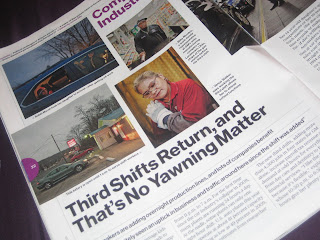For all publicly traded companies on the New York Stock Exchange or the NASDAQ, a company must file a document every year called a 10-K to the U.S. Securities and Exchange Commission (SEC).
A somewhat standardized document in terms of content, the 10-K contains information about how the company participates/competes in the global marketplace, the compensation of executives, financial data, etc, etc, but also a list of "risk factors" that may impact a company's future ability to attain earnings.
On February 12, 2012 the publicly traded Consol Energy (CNX on the NYSE) with a market cap of $8.5 billion mentioned in its 10-K the following "risk factor" which can cause an investor to lose value in their investment:
"If
we cannot find adequate sources of water for our use or are unable to
dispose of the water we use or remove it from the strata at a reasonable
cost and within applicable environmental rules, our ability to produce
gas economically and in commercial quantities could be impaired."
further...
"As
part of our drilling and production in the Marcellus shale, we use
hydraulic fracturing processes.
Thus, we need access to adequate sources
of water to use in our Marcellus shale operations.
Further, we must
remove and dispose of the portion of the water that we use to fracture
our shale gas wells that flows back to the well-bore as well as drilling
fluids and other wastes associated
with the exploration, development or production of natural gas.
Our inability to
locate sufficient amounts of water with respect to our Marcellus Shale
operations, or the inability to dispose of or recycle water and other
wastes used in our Marcellus shale and our CBM operations, could
adversely impact our operations.
For example, in Ohio, injection of gas
well production fluids was temporarily suspended for underground
injection disposal wells near Youngstown while regulatory authorities
investigate whether injection of wastewater into the wells is causing
low category earthquakes in the area."
- - -
While this one perceived risk factor is among a laundry list of risk factors, it is interesting to note how the Youngstown earthquakes (presumably caused by the D&L disposal of fracking waste into the earth) has made it into a company's released documents to the SEC.
Towards a Working Class Bible
3 days ago





